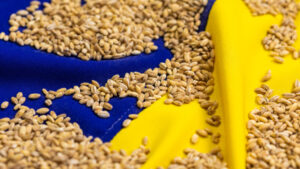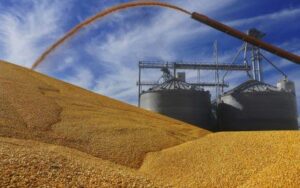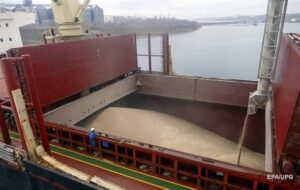
The Polish government has received a letter from the European Commission demanding to lift the indefinite embargo on duty-free imports of certain agricultural goods to Poland, Agriculture Minister Czeslaw Sekerski said at a press conference after meeting with representatives of the All-Polish Association of Farmers’ Unions and Agricultural Organizations on Thursday.
“There is a growing danger of a return to the grain crisis of a year ago. The European Commission is demanding that Poland lift the embargo on agricultural products from Ukraine, and farmers are concerned that Ukrainian grain will be only a transit in the new year,” cenyrolnicze.pl quoted him as saying.
The Polish publication noted that after the new year, farmers’ fears about the inflow of agri-food products from Ukraine will not disappear. Gustaw Endrejek, President of the Lublin Chamber of Agriculture, received signals that Poland resumed imports of four types of grain from Ukraine on January 1.
“We don’t know what will happen at the border, as there is contradictory information about the transportation of grain to Poland as duty-free imports,” the newspaper quoted Gustaw Endrejek as saying.
At a press conference, Minister Sekerski assured the public that the resolution on the unilateral closure of the Polish-Ukrainian border is in effect despite Brussels’ demand to resume imports.
“This embargo is indefinite. We believe we already have evidence of this, because we have received a letter from the European Commission demanding the embargo be lifted,” Sekerski explained.
As reported, on Thursday, the Ministry of Agriculture and Rural Development of Poland on Twitter quoted Minister Sekerski as saying that he supported the strikers’ demands, which, however, should be adapted to the current legislation in Poland, including EU legislation. He noted that legal authorization of all the demands would take time. In any case, the Polish-Ukrainian border will not be opened and the embargo on imports of Ukrainian agricultural products will be indefinite.
On January 4, farmers from the organization “Podkarpackie Deceived Village” resumed protests and blockades of the Medyka-Shehynia border crossing, which were suspended on December 24, 2023. The leader of the organization, Roman Kondruv, told Polish media that the organization had not received written confirmation that its demands would be met, so the protest would continue.
The farmers started their protest on November 23 last year, and stopped it a month later. On the eve of Christmas, Polish Minister of Agriculture Czeslaw Sekerski came to Medyka and assured that the farmers’ demands would be met.
Polish farmers insist on receiving written assurances from the Polish government that their demands will be met. These include the abolition of the agricultural tax increase, easier access to soft loans to support the liquidity of their farms, a 1,000 zloty per hectare corn subsidy, and regulation of the conditions for importing food from Ukraine.
On Wednesday, Polish Prime Minister Donald Tusk emphasized the importance of ending the blockade, especially in the face of escalating bombing and increasingly intense Russian actions. He believes that the arguments will be better heard when Poland is not the country blocking the borders.

Slovakia will extend the embargo on imports of Ukrainian grain from January 1, 2024 for an indefinite period, and will also expand the list of Ukrainian agricultural products for which access to the country’s domestic market will be closed, EFE reports.
According to the agency, which cites a statement by the Slovak Ministry of Agriculture, the embargo on the import of Ukrainian goods – wheat, corn, beets and sunflower seeds – to Slovakia expires at the end of this year. Bratislava has decided to maintain these restrictions.
In addition, the government has decided to expand the list of Ukrainian products that will also be subject to an import ban starting January 1, 2024, including barley, wheat flour, cane sugar, malt, soybeans, honey, and some other products.
All products subject to the restrictions can cross the country’s border only in sealed transit. The purpose of these measures is to protect local agricultural producers.

On Tuesday, Warsaw informed the European Commission (EC) of its decision to unilaterally extend the embargo on grain imports from Ukraine to Poland if such measures are not adopted in Brussels, Polish radio reports.
“At the end of the government meeting, the Prime Minister’s Office informed that the Cabinet of Ministers called on the EC to extend the ban on grain imports from Ukraine, which expires on September 15,” the radio reports.
“Otherwise, Poland will impose such a ban on its own at the state level,” the report says.
“The government has decided to extend the ban on the supply of Ukrainian grain to Poland,” Polish Agriculture Minister Robert Telus said on Polish television earlier on Tuesday. – “This will benefit farmers, the Polish economy and European solidarity.
Polish television reminds that the ban on grain imports from Ukraine to the five frontline EU countries that are neighbors of Ukraine – Poland, Bulgaria, Hungary, Romania and Slovakia – is in effect until Friday. All of these countries have sent a request to the EU leadership to extend the embargo until the end of the year. No decision on this issue has been made yet.
The European Commission has banned imports of wheat, corn, rapeseed and sunflower seeds originating in Ukraine to Bulgaria, Hungary, Poland, Romania and Slovakia since May 2. On June 5, it was decided to extend these measures until September 15.
Brussels then stated that these “exceptional and temporary preventive measures” are necessary due to overcrowding in warehouses and difficulties due to the existing serious bottlenecks in logistics faced by these countries.
The European Commission also reported that the transit of these goods through these five frontline countries to the EU or other countries outside the EU remains possible.

Bulgaria has imposed a temporary ban on imports of agricultural products from Ukraine, except for goods that are in transit, Acting Prime Minister Galab Donev said.
“The main reason is that last year, contrary to the idea of the so-called “solidarity corridors,” significant amounts of food remained in the country and the main production and trade chains were disrupted. If this trend persists and even intensifies, which is quite possible after the introduction of similar bans from other countries, it could have very serious consequences for Bulgarian businesses,” bnr.bg quoted Donev as saying at Wednesday’s government meeting.
According to the acting prime minister, the government is forced to take this measure because “responsible European authorities are still considering an adequate response to the changed circumstances to which the solidarity corridors have led.”
Donev expressed hope that Brussels would hear the positions of EU member states – Bulgaria, Poland, Hungary and Slovakia – and reconsider its own. “Bulgaria remains in solidarity with Ukraine, but the bankruptcy of Bulgarian agricultural producers will not help this cause,” the prime minister stressed.
At Wednesday’s meeting, the Bulgarian government will decide on the duration of the temporary ban on imports of agricultural products from Ukraine.
Poland on April 15, after the congress of farmers, made a unilateral decision to temporarily halt imports of any agricultural products from Ukraine until June 30, 2023, despite the fact that on July 7, a bilateral agreement was reached with Ukraine to temporarily suspend exports of only four crops – wheat, corn, canola and sunflower, while transit was kept, but with tightened conditions, which the parties planned to agree upon quickly.
Similar decisions were then taken by Hungary and Slovakia.
On the night of April 20, Poland resumes the transit of Ukrainian agricultural products, but will apply a number of control mechanisms.

The G7 countries are planning to impose an embargo on the import of Russian gold in order to deprive the Russian Federation of tens of billions of dollars a year, US President Joe Biden said.
“The United States has imposed unprecedented spending on Putin to deprive him of the income he needs to finance the war against Ukraine. Together, the G7 will announce that we will ban the import of Russian gold – a major export that brings Russia tens of billions of dollars,” Biden tweeted on Sunday.
Earlier it was reported that the meetings of the leaders of the G7 countries, which will also be joined by the leaders of Argentina, India, Indonesia, Senegal and South Africa, will be held in Germany from June 26 to 28.
US National Security Council spokesman John Kirby said that, among other things, the summit participants will discuss new measures aimed at isolating Russia from the world economy and disrupting supply chains for the Russian defense complex. It is also planned to reach new agreements to reduce energy and food prices in the world.
The summit will take place in the Bavarian Alps in Elmau. The last summit chaired by Germany, when Angela Merkel was Chancellor, was also held there.

Austria is ready to participate in the embargo of oil from Russia if the relevant decision is made by the European Commission, said Minister of Climate, Environment and Energy of the country Leonore Gewessler.
“So far there is no proposal from the European Commission, but Austria is ready to consistently participate in the oil embargo if the commission and the participating countries are ready to introduce it.
According to her, Austria is prepared for this. Previously, about 10% of Austria’s oil imports came from Russia. Recently, active work has been carried out to reduce this share, and in March there was no purchase of Russian oil. But the situation in different EU countries is different, she noted.
© 2016-2026, Open4Business. All rights reserved.
All news and diagrams placed on this Web site is made for internal use. Its reproduction or distribution in any form are welcome in case of placing a direct hyperlink to a source. Reproduction or distribution of information which contains Interfax-Ukraine as a source is prohibited without the written permission from the Interfax-Ukraine news agency. Photoes placed on this site are taken from open sources only; rightholder are welcome to make demands to info@open4business.com.ua , in this case we are ready to put your copyright to a photo or replace it.